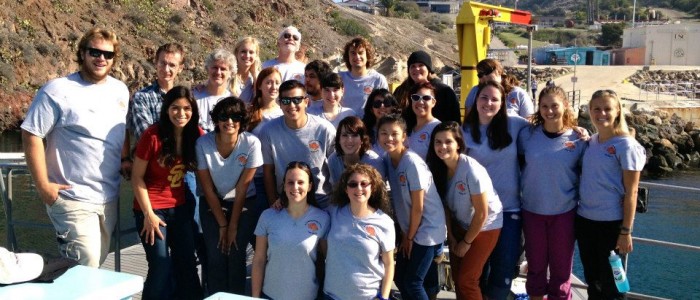FALL 2024 Marine Biology Semester
Santa Catalina Island

Overview
This semester-long program provides an intensive undergraduate exposure to marine biology, and is designed for students with a serious commitment to environmental and marine science. The 15 week program is based at the Wrigley Marine Science Center (WMSC), situated on Santa Catalina Island, 26 miles from Los Angeles, CA. This location provides access to beautiful, pristine marine habitats, diverse marine life and breathtaking island views. WMSC is owned and operated by the University of Southern California (USC), and the program is being offered through the California State Universities, affiliated with the Ocean Studies Institute (OSI) and the Southern California Marine Institute (SCMI).
Throughout the semester, students are introduced to a sequence of courses that prepare them to complete a directed research study in a topic of their choice. All courses provide a strong element of hands-on field experience, which provides the comprehensive training that can help in career choices and graduate decisions. Please note: these courses will occupy daytime and in many cases, evening hours, including some weekends.
Applications are closed for the Fall 2024 Semester and are no longer being accepted.
Application Materials:
- Completed Fall 2024 CSU Marine Biology Semester Application
- Unofficial College Transcripts
- One letter of recommendation from faculty member
Qualified students are accepted on a rolling basis with priority given to applications submitted by February 23, 2024. The CSU Marine Biology Semester is an upper division program that is designed for students who have completed their lower division coursework in Biology. For Fall 2024, after screening by the CSUN faculty, registration will be through California State University Northridge (CSUN). CSUN students will register directly through that campus. Other CSU students will need to fill out the Intrasystem Visitor Enrollment form, which will enable registration through CSUN. Units may then be transferred to the appropriate campus. Non-CSU students will need to register through CSUN Open University Program.
Required Prerequisites:
- Biostatistics (or an equivalent course)
Optional Prerequisites (Strongly Recommended):
- AAUS SCUBA Certification Course – A two-week AAUS SCUBA certification course is available at an additional cost for qualified students who wish to dive on SCUBA during the semester. However, only snorkeling skills are required for class participation.
- Motorboat Operating Training Course (MOTC) – This one week course will be required if you plan on operating small vessels while at CSU Catalina Semester. This course is free for all CSU/OSI students.
These prerequisites courses will be available during the summer. They are not required to participate in the CSU Catalina Semester however may be helpful to students while conducting their directed research projects. For additional information on the courses please contact OSI Dive & Boat Safety Officer Darrell Montague: Darrell.Montague@csulb.edu
Application and additional information can be obtained by contacting:
CSU Marine Biology Semester at Catalina
Ocean Studies Institute
820 S. Seaside Ave
San Pedro, CA 90731-7330
562-985-3172
osi.catalina@gmail.com



Projected Costs – FALL 2024
| A. Tuition (15 Unit Semester)* | |
| CSU Undergraduate Student (CA Resident) | $3,545.00* |
| CSU Graduate Student (CA Resident) | $4,262.00* |
| Non-CSU Student & Non-CA Residents | $9,485.00* |
| B. Board, Lodging, & Facility Fees* | |
| (Same for all students) | $7,969.00* |
*Note: These costs are estimated and are subject to change. Board, Lodging, and Facility fees may be reduced with scholarship funds however, it is not a guarantee. CSU Students who are non-CA residents are subject to CSU Out-of-State tuition fees. Two round-trip passages to the island are included (at the start and end of the semester, and over Thanksgiving). There will be additional costs for books, dissecting equipment, library privileges and personal field equipment.
Courses Offered:
- Ecology of Marine Fishes
(BIOL 531/L; 592Q: 4 units)
A course covering species assemblages, general ecology, and behavioral ecology of the marine fishes of Catalina Island and the surrounding waters.
Instructor: Dr. Mark Steele
- Marine Invertebrate Zoology
(BIOL 313L; 392B: 4 units)
This course provides a classical overview of marine invertebrate diversity, structure and function through a combination of lecture, lab and field experiences.
Instructor: Dr. Peter Edmunds
- Marine Ecology
(BIOL 492/L; 492: 4 units)
This course provides a general understanding of the ecological processes that determine the structure and dynamics of populations and communities in marine ecosystems through a combination of lecture, field and lab experiences.
Instructor: Dr. Casey terHorst
- Undergraduate Directed Research
(BIOL 495B/696B: 3 semester units)
Students develop their ideas during the first 12 weeks of the semester, prepare a research proposal, complete their studies, and present their findings in a mini-symposium and a report.
Instructors: Drs. Edmunds, terHorst & Steele
Instructors:
- Dr. Peter J. Edmunds (Invertebrate Zoology) received his Ph.D. in 1986 from University of Glasgow and has been on the faculty at CSUN since 1992. His research focuses on the physiological ecology of temperate and tropical reef invertebrates and corals.
- Dr. Casey terHorst (Marine Ecology) received his Ph.D. from Florida State and has been on the faculty at CSUN since 2013. His research focus on the consequences of evolution and genetic variation for interactions between species in a wide variety of communities.
- Dr. Mark A. Steele (Ecology of Marine Fishes) received his Ph.D. from the University of California, Santa Barbara in 1995 and has been on the faculty of CSUN since 2006. His research focuses on the population and community ecology of temperate and tropical reef fishes and estuarine fishes.
*Courses and Instructors may change










